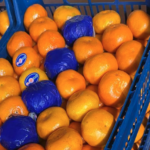EU Parliament approves state autonomy in GM crop restrictions

European Union parliamentarians have voted overwhelmingly in favor of legislation that will allow member states to restrict or ban the cultivation of genetically modified organisms (GMOs).

Frédérique Ries is in charge of steering the legislation through the EU Parliament.
Under the new framework, member states will be able to choose from a range of reasons to ban GMOS, including environmental, planning requirements, socio-economic impacts and farm policy objectives, regardless of existing grounds set by health and environmental risks established by the European Food Safety Authority (EFSA).
The legislation was informally agreed upon by the Parliament and Council in December, after four years of tussling between pro- and anti-GM country representatives.
In a release, the EU Parliament said the legislation would come into force this spring, after it was approved by 480 votes to 159, with 58 abstentions.
"This agreement will ensure more flexibility for member states who wish to restrict the cultivation of the GMOs in their territory. It will, moreover, signpost a debate which is far from over between pro- and anti-GMO positions," said Frédérique Ries (ALDE, BE), who is steering the legislation through Parliament.
"As to what comes next, I place my trust in Commission President Jean-Claude Juncker's formal pledge to strengthen the democratic process on GMOs in Europe and ensure that research is genuinely independent," she added.
In an article, Ries said she hoped there would be an obligation that affected farmers be compensated once the legislation is updated.
"This directive is not about products, but only about their cultivation. Large quantities of animal feed containing GMOs are imported into the EU. However, this hasn't been addressed by this proposal, nor was transport or research," she clarified.
"I think it will mainly affect transparency, reduce conflicts of interests and lead to better management."
The initial release highlighted the only GM crop currently cultivated in the EU was MON810 maize, after the EU General Court banned the GM "Amflora" potato in 2013.
If a member state decides to restrict or ban GMO crops, the legislation provides for a procedure enabling the GMO crop company to consent to such restrictions on its marketing authorization. However, if the company disagrees, the member state may impose a ban unilaterally.
Under the new guidelines, member states will also need to ensure GMO crops do not contaminate other products, paying attention to preventing cross-border contamination.
EU Health Commissioner Vytenis Andriukaitis congratulated parliamentary members, Fries and the Council for moving beyond their differences to make a significant step forward.
"The agreement meets Member States' consistent calls since 2009, to have the final say on whether or not GMOs can be cultivated on their territory, in order to better take into account their national context," Andriukaitis said in a press statement.
"The agreement retains a strong risk assessment and authorisation system for GMOs guaranteeing a high and uniform level of safety throughout the EU.
"I fully trust that this legislation will be endorsed in the coming weeks by the Council, allowing the Member States to start exercising their extended capacities to decide on GMO cultivation as from spring this year."








































